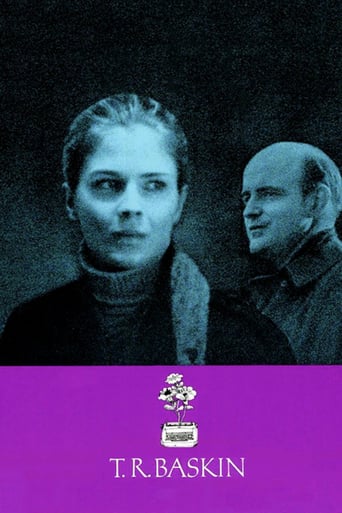avenuesf
I finally got a chance to see a (poor) print of this film today after wanting to see it for years. I could appreciate its originality and sophistication for the time that it was made, but I was left wondering just what the film was really trying to say. It worked more as a character study than a film. The theme of the cruel and impersonal big city seemed to be a recurrent one in the 1970's (much like "Midnight Cowboy"), and seemed to be a symbol for the lost individual trying to find meaning in life. I've never been able to believe Candice Bergen in any role I've ever seen her play, and this film is a good example. She's stiff and virtually emotionless in most of this, except for two scenes where her acting became so exaggerated that it was almost embarrassing; once where she laughs uncontrollably (more like shouts) when she is conversing with Peter Boyle and another at the end where she cries after a telephone conversation with her parents. They both sounded exactly the same, and were frankly kind of startling, leaving me wondering why the director allowed her to go so far and didn't ask for another take where she toned it down a little.The "plot" never really goes anywhere. T.R. seems vacant, zombie-like and sarcastic, and the flashbacks gave me the impression they were being intentionally inserted to make a point when the film would come to an end. They didn't. The scenes in the film could have been played in real time as they happened and it wouldn't have made any difference at all.There's some dialogue between Bergen and Caan in which she tells him that he "talks like a typewriter." I felt like this described a lot of the film; people don't talk or act this way, and I'm sure it looked great on paper. I can appreciate that this film portrayed a character and her experiences in a very different way for its time, but it didn't really seem to make a conclusion about anything.
mmcaskey
T.R. Baskin was a favorite of mine. I have been trying to find it for years. With a cast as strong as this, I wonder why it has never been released in DVD or video. I would love having some help finding this!! What resonated with me was a line Bergen had - How do you know when you are accepting too little for yourself or expecting too much? I have been trying to answer this my whole life. I didn't remember that it was shot in Chicago, and I would love to see the 1971 shots of that as well.And I remember the music too was excellent. Please re-release it!Candace Bergen stood out as a performer in this. I knew of her acting before this - but she really stood out in this role.
bob.decker
. . . to get this movie released on DVD? I too am among those who saw it on television years ago and who remember bits and pieces of the dialog (like, to paraphrase, "It's like admiring someone from a distance and when you get up close to him you notice he has bad skin." If I recall correctly Candace Bergman speaks this line while looking down on Michigan Avenue from a high-rise apartment, perhaps in the John Hancock building, and it served as a metaphor for what she found out about life in the big city). Its soundtrack was also liable to turn up frequently in the 98 cent bargain bins and this is how I happened to recognize it when it showed up on the CBS late movie in the late 1970s. The Chicago location was unusual for a 1971 film -- well before pictures like "The Blues Brothers," "Ordinary People," and "Risky Business." Candace Bergman's performance, and way of delivering lines, was indeed mesmerizing, and this film's unavailability and obscurity makes unavailable and obscure a certain moment in 20th century American history that we don't think too much about; it is rather like the dark side of the Mary Tyler Moore show, a snapshot of a lost generation. Please, someone bring it back.
trudyr_1999
This film is in some ways a guilty pleasure--it's occasionally hokey--but I like it because it reminds me of the wonder I felt on my first few visits to Chicago (I'm a small-town girl too). I eventually moved there, staying more than a decadebefore moving on to L.A.; my experience was, on the whole, much more positive than T.R.'s, but I can relate to her and to what she's going through. That's a good deal of this movie's appeal--the characters and the situations all have the ring of truth. Kudos to writer Peter Hyams and director Herbert Ross. T.R. may be lonely and lacking in direction, but she's also intelligent, feisty, and nobody's fool, and it's easy to understand how she feels as she tries to build an independent life and find personal and professional satisfaction. Candice Bergen's delivery of her lines is sometimes a bit stilted, but her performance is largely praiseworthy; so are those of the supporting cast, especially Marcia Rodd, James Caan, Peter Boyle, and Howard Platt (very convincing as a real jerk). The filmmakers also make good use of the Chicago setting, with shots of Carson's State Street store, the el, and other landmarks, and the movie's full of early-'70s atmosphere--the clothes, the music, the singles bars, and the fact that the modern women'smovement had a lot of work to do.




